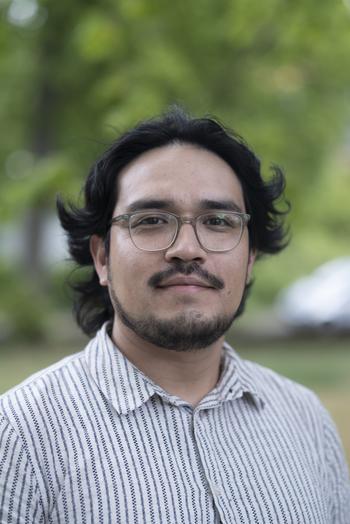Amir Estrada Ceron

International Research Training Group 'Temporalities of Future in Latin America'
PhD Candidate
Anthropology
Project: "Forced migration in and to Mexico, towards the integration of all migrants"
14195 Berlin
Education
| Since 05/2025 | PhD Candidate, International Research Training Group ‘Temporalities of Future’, Freie Universität Berlin (FU Berlin). |
| 01/2020 – 12/2022 | Master in Social Studies, work, labor regulation, and organization at Benemérita Universidad Autónoma de Puebla (BUAP) and Ruhr Universität Bochum (RUB), Mexico and Germany. |
| 08/2013 – 08/2018 | Bachelor in Sociology at BUAP, Mexico. |
Work experience
| Since 05/2025 | Researcher, International Research Training Group ‘Temporalities of Future’, Freie Universität Berlin (FU Berlin), Germany. |
| 04/2023– 04/2025 | Statistician (conceptual designer) at the Census of Housing and Population, Instituto Nacional de Estadística y Geografía (INEGI). |
| 02/2022 – 08/2022 | Research assistant at the Forced Migration and Organized Violence (FORMOVE) project. FUB, RUB, and BUAP. |
| 07/2019 – 06/2021 | Parliamentarian consultant on Human Rights and communication. Congreso del Estado de Puebla. |
| 01/2019 – 06/2019 | Survey interviewer at the Economic Census 2019, INEGI. |
Project: "Forced migration in and to Mexico, towards the integration of all migrants"
Supervisor: Prof. Dr. Stephanie Schütze, Freie Universität Berlin
Forced migration in Mexico is largely driven by extractivist practices and corporate agendas, which displace people caught in cycles of violence and crisis. Over time, Mexico has gone from being a “vertical border” to acting as a “buffer country” restricting the aspirations of migrants originating from Central America, and Venezuela, among others, and failing to ensure minimal protections. Despite recognizing the seriousness of the situation, Mexico's institutional response has been far from adequate, considering that this problem affects both international migrants and internally displaced persons, who often face stigmatization and discrimination.
Studies on migration have focused on its causes and outcomes, and lately emphasize the dimensions of integration processes, cultural change, and ethnic identity. In addition, a broader concept of forced migration has been explored to include all ‘types’ of migrants, whether refugees, asylum seekers, or those displaced by violence, persecution, or natural disasters. In turn, in historical terms, the disruptions between past and present have been analyzed, but recently a path has been opened towards examining the role of the future in shaping migration policies and the experiences of migrants.
Thus, investigating the future of integrating all forced migrants in Mexico can provide a synthetic axis of analysis, beyond the administrative categories with which this social phenomenon has been defined and managed.
For all of the above reasons, it is proposed to study the integration processes of forced migrants in and to Mexico, through a comparison of the local and international displaced population, and thus explain how their experiences influence the future integration of all people forced to migrate; this through the technique of autobiographical interviews to explore their visions of the future and using the thematic analysis to categorize and analyze the information collected.
Articles
Estrada Ceron, B. A. & Pries, L., Calderón Morillón, O. (2024). Trajectories of Forced Migration: Central American Migrants on Their Way Toward the USA. Journal on Migration and Human Security, 12(1), 39-53. https://doi.org/10.1177/23315024231216109
Chapters
Estrada Amir, Óscar Calderón Morillón, Marlene Rodríguez, Axel Ortíz, Karla Gutiérrez, Estefanía Guitiérrez, and others, ‘Investigating In-Transit Migration through Mexico within the Context of Violence and the Pandemic’, in Forced Migration across Mexico: Organized Violence, Migrant Struggles, and Life Trajectories, ed. by Ximena Alba Villalever, Stephanie Schütze, Ludger Pries, and Óscar Calderón Morillón, Routledge Studies in Development, Mobilities and Migrations Series (Routledge, 2024).


